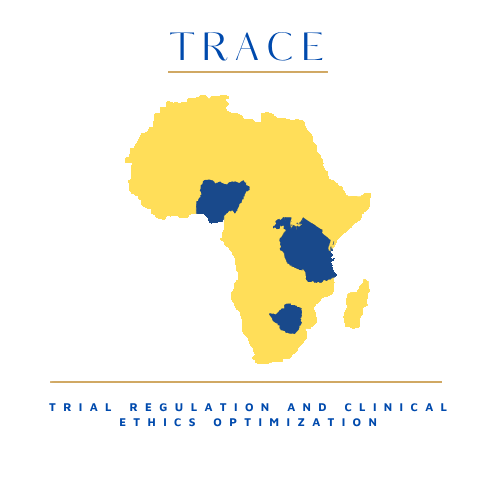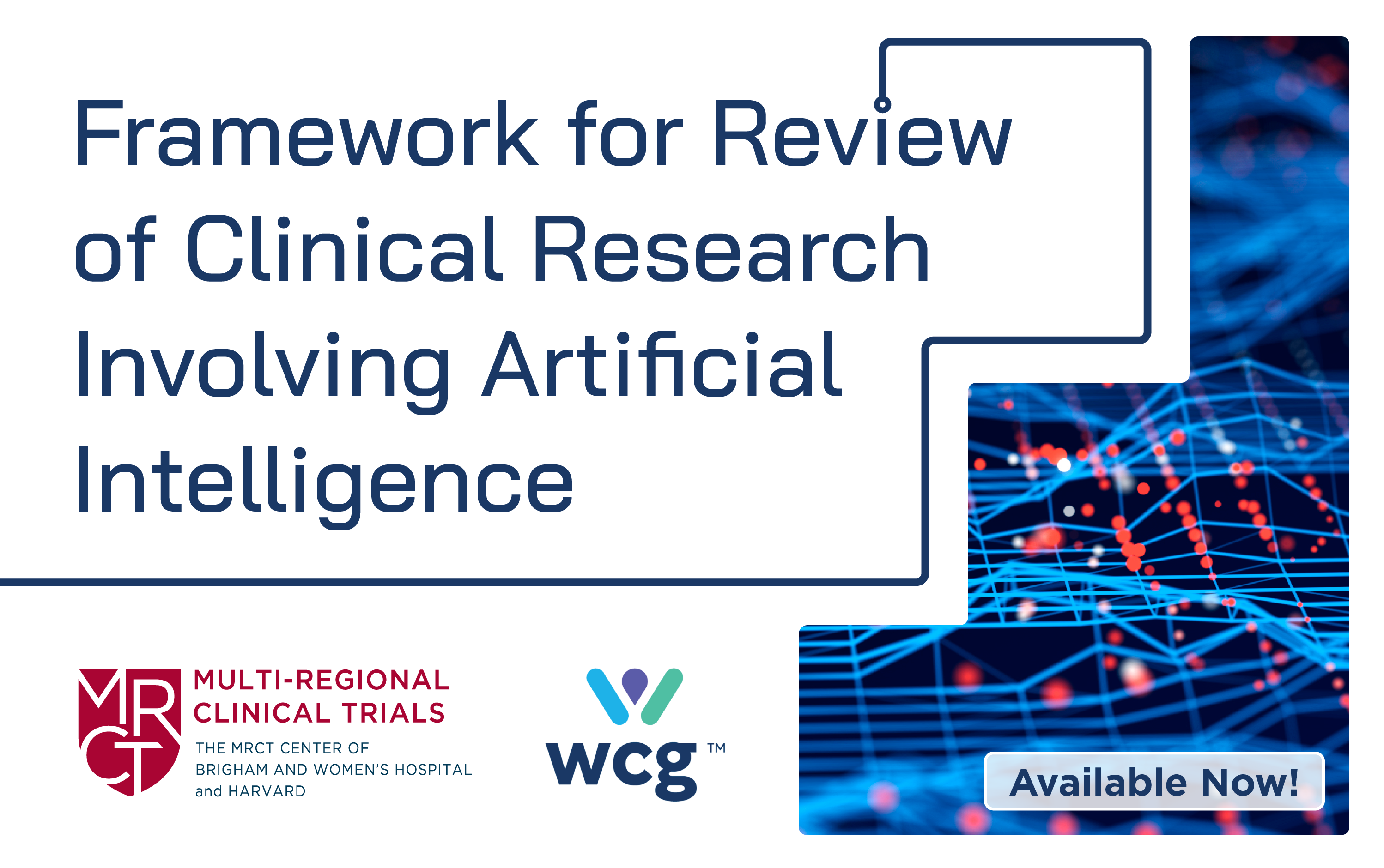In the Spotlight
Framework for Review of Clinical Research Involving Artificial Intelligence (AI)
As part of the MRCT Center’s AI and Ethical Research project, the Framework for Review of Clinical Research Involving AI was co-developed by the MRCT Center and WCG, in collaboration with a diverse, multi-stakeholder task force. This resource offers institutional review boards (IRBs) and other oversight entities a structured, practical approach to evaluating protocols that involve artificial intelligence in research with human participants. The framework addresses emerging ethical and regulatory challenges specific to AI—such as algorithmic bias, adaptive learning, data identifiability, and the need for human oversight—while aligning with foundational ethical principles and applicable U.S. regulations. Through tools including a decision tree for regulatory applicability, stage-specific review guidance, and targeted ethical considerations, the framework supports consistent, thorough review processes that protect participants and promote the responsible use of AI in clinical research.
Introducing TRACE: Trial Regulatory and Clinical Ethics Optimization
The TRACE project is a dynamic initiative to strengthen and streamline clinical trial regulatory and ethics systems across Africa.
The MRCT Center, as a member of TRACE’s Core Project Team and lead of the Capacity Building & Accreditation and Funding Models sub-teams, is working alongside the African Vaccine Regulatory Forum (AVAREF) and Garnet Partners, with funding support from the the Gates Foundation, to design and implement sustainable regulatory and ethics solutions.

Despite growing interest in African clinical research, sponsors still encounter unclear submission pathways, manual or outdated systems, redundant reviews, and unpredictable timelines, all barriers TRACE aims to eliminate.
The initiative’s initial focus on Rwanda, Tanzania, Zimbabwe, and Nigeria drives regulatory optimization, ethics systems strengthening, and regional capacity building to create transparent, predictable, and efficient review processes that attract more trials to the region.
Dr. Barbara Bierer has recently completed a series of country visits to support TRACE’s core priorities. Between April and June, she visited Nigeria, Rwanda, Zimbabwe (with Sarah White), and Tanzania. Working closely with national partners, these visits focused on assessing current national ethics review systems, introducing the WHO’s tool for benchmarking ethics oversight, and identifying collaborative long-term strategies for financial sustainability. By working directly with local stakeholders, TRACE is supporting country-led solutions that will evolve throughout the project and help align practices with global standards.
On-Demand Webinars and Resources
Your Voice, Global Impact: Join the Clinical Research Glossary’s Annual Public Review Process
This on-demand webinar, presented on June 24, provided an overview of the MRCT Center’s Clinical Research Glossary—a plain-language reference defining 187 clinical research terms, with 30 new terms open for public comment through July 5. It detailed the feedback submission process to ensure accuracy and inclusivity and underscored the significance of this input in advancing adoption as a CDISC global standard, empowering participants to make informed decisions. The recording, presentation slides, and related materials are now available.
A Framework for AI Adoption and Oversight in Clinical Research
As discussed above, this on-demand webinar, also presented on June 24, introduces a structured framework to support institutional review boards and sponsors in the ethical oversight of clinical research protocols involving artificial intelligence. The webinar includes an overview of the framework’s development, key considerations for risk-benefit analysis, and practical tools to guide decision-making. The recording, presentation slides, and related materials are now available.
Patient-Centered Long-Term Follow-Up for Gene Therapies
This on-demand webinar, presented on June 26, examines the FDA’s recommendations for long-term safety monitoring of gene therapy recipients—recognizing both the transformative benefits and potential health risks—and highlights the critical need to design follow-up studies around patient needs and preferences to minimize burdens. Building on prior discussions of platform trials and registries, this webinar emphasizes strategies to reduce burden and enhance participant-centered practices. Perspectives include insights from a foundation tackling patient loss to follow-up, expertise on embedding patient-centric culture change into study design, and a patient advocate’s lived experience emphasizing the power of patient voices in shaping compassionate, sustainable LTFU frameworks. The recording, presentation slides, and related materials are now available.
Biannual Meeting of the Joint Task Force for Clinical Trial Competency
The slides and Executive Summary from the June 2 biannual global meeting of the Joint Task Force for Clinical Trial Competency (JTF) are now available.
Topics:
- Integrating JTF Competencies: Curriculum Design and Accreditation at Arizona State UniversityComprehensive leveling of the Clinical Research Professional Career Ladder at Johns Hopkins University
- Results from a Delphi study on data management competencies
- Expanding the Core Competency Framework to include patient, participant, and public engagement and partnership
- Updates from the Patient Participant Project workgroup
Save the Date: MRCT Center Annual Symposium – Meeting the Moment
Wednesday, October 22 | Boston & Virtual
Join us for a full day of discussions and presentations on ethical, actionable, and practical solutions to today’s global clinical research challenges. Engage with regulators, industry leaders, patient advocates, and research experts to gain privileged insights, shape the conversation, and forge connections that drive real-world impact. The symposium is free and open to all registrants. A detailed agenda with speakers and panels is forthcoming.
On Thursday morning, join a co-branded program with Vivli: “Data in Action: From Contribution to Impact”—also complimentary and open to all Symposium registrants.
Register today to secure your spot and help drive responsible innovation in clinical trials.
Events & Presentations
June 10: FasterCures, in partnership with the MRCT Center, convened the most recent webinar in the Convergence Project series, “From Barriers to Breakthroughs: Funding, Resources, and Support to Improve Clinical Trial Access and Innovation,” to explore actionable strategies for dismantling financial and structural obstacles to trial participation. Leaders from the Foundation for the National Institutes of Health, the American Cancer Society, Eli Lilly, Pfizer, Walgreens, and the Michael J. Fox Foundation spoke about funding models, addressed participant costs and insurance challenges, and showcased sustainable, equitable partnership approaches. Meeting registrants will receive a summary of the webinar sessions via email from FasterCures/Milken in the coming weeks.
June 16-24: Dr. Barbara Bierer and Sarah White visited leadership and members of the Medicines Research Council of Zimbabwe (MRCZ) and the Medicines Control Authority of Zimbabwe (MCAZ) for the TRACE Project Benchmarking meetings. The four days of meetings took place at the MRCZ and MCAZ offices, and the office of the Ministry of Health and Child Care in Harare, Zimbabwe. From June 23-24, Dr. Barbara Bierer continued TRACE Project benchmarking visits to Dar es Salaam and Dodoma, Tanzania to meet with leadership and members of the National Institute for Medical Research (NIMR) and Tanzania Medicines and Medical Devices Authority (TMDA). The purpose of these benchmarking visits was to initiate baseline assessments of the operations and infrastructure of the national research ethics committee boards and offices, a process that each country will complete on its own. Dr. Bierer will return to Africa in late July to attend the TRACE Project in-person Core Committee meetings in Kigali, Rwanda.
See TRACE Spotlight above.
July 16: Lisa Koppelman will lead an interactive session at the iCAN 2025 Summit in Montreal (July 14–16) titled “Time for a Reboot: Updating the Including Young People in Research Toolkit.” Young people and adult stakeholders from clinical research and related fields will revisit the engagement model that underpins the toolkit. Afterward, participating youth may apply to join a reference group tasked with reviewing the updated tools, materials, and resources.
July 17: The MRCT Center and Vivli will co-facilitate an invite-only forum, “From Policy to Practice: Implementing the European Health Data Space (EHDS) for Responsible Data Sharing.” This forum is part of a four-part series of convenings.
July 24-25: The MRCT Center joins Innovative Therapies for Children and Adolescents with Cancer, the Children’s Oncology Group, and the Leukemia & Lymphoma Society to host an invitation-only workshop in Washington, DC, “Advancing Childhood Cancer Academic-Industry Collaborative Platform Trials.” Building on the October 2024 Advancing Pediatric Platform Trials workshop, participants will work together to accelerate academic-industry platform trial collaborations in pediatric oncology and bring safe, effective therapies to young people with cancer.
Publications
May 8: In the article “Benefits that Offset Research Risks and Burdens are Qualitatively Different,” published in The American Journal of Bioethics, Barbara Bierer joins co-authors Luke Gelinas and Benjamin C. Silverman to examine how indirect benefits offered to research participants (e.g., payments, access to medicines) differ fundamentally from direct benefits that justify risk. The authors argue that these categories of benefit must be conceptually and ethically distinguished in research design and review. Their commentary challenges current interpretations of benefit-risk assessment and calls for greater nuance in ethical review frameworks.
April 28: In the article “Managing Multi-Institutional Jurisdiction in Cases of Research Misconduct,” published in the Journal of Law, Medicine & Ethics, co-authors Mark Barnes and Barbara Bierer examine the persistent challenges of jurisdictional ambiguity when research misconduct spans multiple institutions. Together with Leslie Thornton and Devin Cohen, they outline key gaps in current regulatory guidance and propose a framework for collaborative resolution that safeguards fairness and research integrity. The article calls for clearer delineation of institutional responsibilities and improved mechanisms for inter-institutional coordination in misconduct investigations.
April 21: “Defamation Claims Arising from Research Misconduct Cases: Best Practices for Institutions,” published in the Journal of Law, Medicine & Ethics, co-authored by Barbara Bierer and Mark Barnes, as well as Nathaniel Jaffe, Minal Caron, and Lauren Walsh, analyzes nine instances in which defamation suits were employed to obstruct misconduct investigations. It summarizes the legal bases of such claims and key defenses (e.g., Strategic Lawsuit Against Public Participation, truth, opinion), then distills institutional best practices—from calibrated public disclosures to stringent confidentiality protocols—to protect both scientific integrity and institutional resilience.
MRCT Center Updates
The MRCT Center is thrilled to announce the appointments of Michael Lauer, Deputy Director for Extramural Research at the National Institutes of Health – Retired, and Andy Lee, Senior Vice President and Head of Global Clinical Trials Operations at Merck Research Laboratories – Retired, to the External Advisory Board of the MRCT Center.
The MRCT Center External Advisory Board provides constructive feedback relating to long-term strategic planning and vision as well as new programmatic initiatives, strategic partnerships, and existing projects. The board meets annually and brings outside perspectives to the Center, helps to maintain a global perspective and awareness, and supports the Center’s continued growth.
The MRCT Center provides a unique and trusting community to improve the integrity, safety, and rigor of global clinical trials. Join us in our efforts to develop innovative solutions and aligned approaches to global clinical research.
Learn more about becoming an MRCT Center sponsor.


